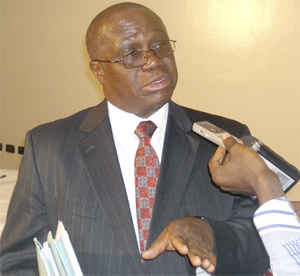 Dr Henry Kofi Wampah - BoG Governor
Dr Henry Kofi Wampah - BoG Governor
Ghana’s central bank faces an uphill task as it decides whether to sacrifice growth to achieve price stability or soften monetary policy to give businesses some breathing space.
The bank’s Monetary Policy Committee (MPC) will meet next week, January 22 to deliberate on recent happenings in the Ghanaian Economy and announce its decision (policy rate) on Monday January 25.
Some economists have criticized the Bank of Ghana (BoG) for poor judgment in its continuous tightening of monetary policy especially because “the monetary policy rate has been upwardly adjusted many times yet inflation keeps going up, interest rates remain one of the highest in Africa.”
According to them, it will be difficult for the BoG to achieve price stability due to the fact that recent increments in utility tariffs and that of fuel are set to lead to higher inflationary pressures.
Senior Lecturer at the Ghana Institute of Management and Public Administration (GIMPA), Dr Raziel Obeng-Okon says there is a potential upward risk to inflation forecasting due to additional taxes introduced on fuel in January 2016; increase in withholding taxes from 5 to 7.5 per cent for services in January 2016.
These increments including water and electricity rates in December 2015 by over 69 and 59 per cent respectively were in line with Ghana’s programme with the International Monetary Fund (IMF) which the government signed onto in April last year to restore fiscal balance.
“These inflationary expectations may be enough justification for the Bank of Ghana to continue with the tight monetary policy and increase further the monetary policy rate especially when both the inflationary expectation and exchange rate volatility are high,” Dr Oben-Okon says.
Dr Godfred Bokpin, Economist and Head of Finance Department at the University of Ghana Business School (UGBS) maintains that the policy rate could be increased further due to the challenging business environment.
"If the balance of risk is towards growth then the BoG can lower the policy rate," he stated.
A lowering of the policy rate could see interest rates tumbling down, and should be a welcome relief for businesses most of whom have been starved of credit for expansion of their enterprises.
Interest rates in Ghana now hover between 28 and 36 per cent, making it one of the highest in Africa.
According to Dr Bokpin, "as things stand now, it will be difficult for the BoG to go for growth-friendly or business friendly monetary policies due to the underlying inflationary pressures."
“The BoG is seriously challenged even though it may be difficult for the bank itself to acknowledge this but that is the truth; things would have been easier for them without the new energy sector levies,” he pointed out.
According to him, the Governor of the bank has absolutely no control over some of the things the bank has to respond to, such as the high debt levels and fiscal indiscipline.
It is obvious that the BoG well anticipated the effects of utility tariff increases and so hiked the policy rate to 26 percent, back in November last year.
Giving reasons for the policy rate hike, the regulator had said that “an assessment of current economic conditions show that though monetary policy remains tight, some additional tightening is required to re-anchor the displaced inflation expectations; This, together with the on-going fiscal consolidation, is expected to break the high inflation inertia.”
The bank stated that its forecasts showed that without any additional policy adjustment, inflation was likely to drift farther away from the target band and lengthen the forecast horizon into late 2017.
Even though policy rate hike was set to take into account the utility tariff adjustment as well as the fuel price hikes, it will be interesting to know whether those adjustments fall within the band anticipated by the BoG for which the policy rate was increased by 100 basis points.
The new energy sector levies coupled with expected increments in transport fares have a direct bearing on inflationary pressures which also place undue stress on the economy.
The IMF among others wants the monetary policy stance of the central bank to remain tight to help bring inflation down, against the background of exchange rate volatility.
It says the BoG should stand ready to tighten monetary policy further if inflationary pressures do not recede as expected. This portends a gloomy future for the country as far as growth is concerned.
Senior Lecturer in Economics at the University of Cape Coast, Dr John Gatsi is however confident that the BoG will not adjust the policy rate upwards since in his view, the last review of the rate took into account the inflationary pressures expected from the utility and fuel price hikes.
Contrary to other views, Dr Gatsi maintains that a reduction in the policy rate will not necessarily result in a significant decline in interest rates, for which treasury bills would be less attractive for businesses.